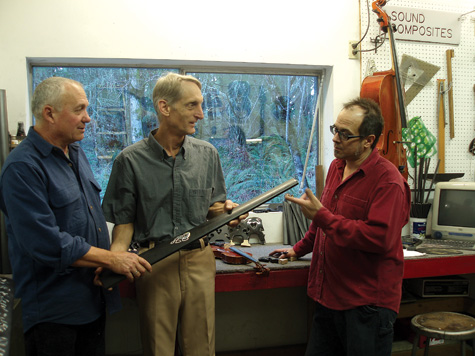 |
 |
|
  |
FEB. 15 I SOUND COMPOSITES I BY KATIE KAILUS Steve Mosher has found the new ebony, and it's not another wood. After watching the effects of deforestation on the MI industry's natural resources supply, he started working on an alternative for such orchestral parts as bridges, tailpieces and fingerboards. The result: Sound Composites, a Eugene, Ore.-based operation that creates stringed instrument parts from carbon and graphite fiber. "In practical terms, the music industry's ebony will soon become unavailable," said Mosher, president and head of research and development. "Other woods are nice but not particularly available either. Right now, there is not a better non-wood alternative than what Sound Composites is offering." Mosher and his five employees manufacture the products at a 6,000-square-foot facility that houses both Sound Composites and Mosher's other venture, Moses Graphite, which he started in 1989. Moses Graphite makes parts for electric guitars and basses. "Every part is made in-house in Eugene," Mosher said. "We are a dedicated U.S. manufacturer." Launched in the third quarter of last year, Sound Composites also has an OEM business and fills individual requests for parts. "People like them because they are parts that are easily installed and removed in case people want to change," Mosher said. "They do not wear and are very even tonally. And they are not objectionable-looking. You can put them on a classical instrument, and most people can't tell the difference." The Sound Difference "They are lighter, basically," Mosher said. "And that lets the acoustic chamber be more responsive to what the player does. We can make them lighter than anything else out there, and we do." Environmentally Friendly "South American ebony is gone, about half of the African ebony supply has been depleted, and we are now working through Indian ebony," Mosher said. "The carbon fingerboards, for example, are a great alternative to the diminishing ebony supply, which is truly an accelerating problem." Coming off Sound Composites' first NAMM show, Mosher is optimistic about the company's future. "Bouncing back from a hard economy and coming back with the same components as before is difficult," Mosher said. "Many are looking for an alternative to be prepared for when the rebound comes. We are ready for that." MI
|
|

